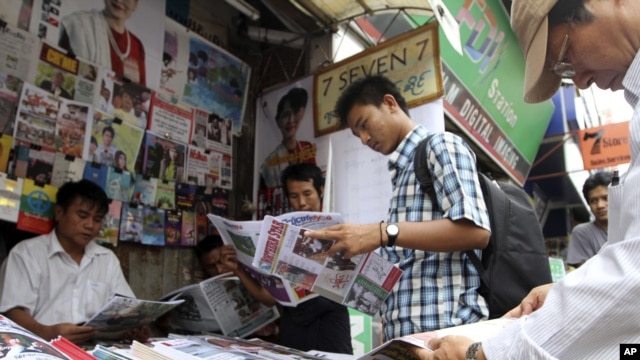
Customers buy local weekly journals at a roadside shop in Rangoon, Burma, Aug. 20, 2012.
Rapidly reforming Burma's decision to ease media censorship is being met with caution in neighboring China, where government officials have been adamant in maintaining their tight control over the flow of information.
Burma announced Monday that local media will no longer be required to submit stories for review to state censors before publication, ending a key component of its long-reviled censorship policy.
The news received a mixed reaction from China's state-controlled newspapers. The People's Daily, the flagship paper of China's Communist Party, ran a fairly neutral account of the story, even quoting a Burmese journalist praising the move as historic.
But the party's Global Times paper was more negative, publishing an editorial saying China should not follow what it called the "uncertain" reform model of Burma, which is also known as Myanmar.
"China should follow the trend of the times and look at the practical situation of the nation, rather than being perplexed and even letting backwater [backwards] countries such as Myanmar and Vietnam become our idols," the editorial said.
Some have wondered whether China, which has undergone its own gradual reform process in the past three decades, would be inspired to speed up its reforms as its long-time ally Burma has done.
But independent Beijing-based China analyst Bill Bishop says Beijing likely does not feel pressured to keep up with its fast-moving neighbor, knowing its own media landscape is much more sophisticated.
"Burma is a much smaller country and a much simpler country in a lot of respects," says Bishop. "There is really not much Internet in Burma, so the information environment is extremely different and much more complex in China."
But Bishop says Beijing's current policy of blocking any online material it deems objectionable does seem unsustainable, partly because it is increasingly unpopular with the Chinese public.
"If you are a participant on Chinese social media, you know censorship is going on, and it is regularly mocked and criticized quite vociferously." says Bishop, who points out that the Chinese Internet was buzzing with conversation on the Burma issue.
"People on Weibo [social media site] were making unfavorable comparisons between China, Burma, and North Korea, and joking that North Korea would open up their media before China. I think that's a bit extreme, but it just shows that people do know what's going on and I think that kind of knowledge becomes very corrosive," said Bishop.
But even though Chinese censorship may be unpopular, observers say it is unclear whether Beijing intends to follow Burma's example and take steps to open up its own media. |
|
